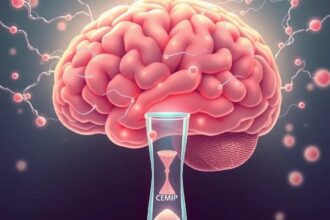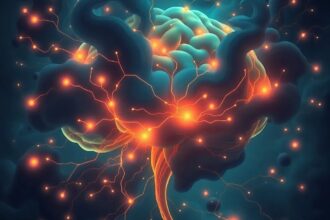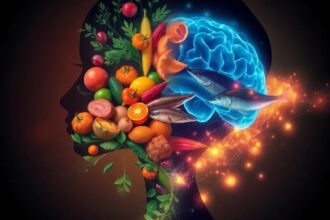Groundbreaking study links high free sugar intake to significantly increased dementia risk, mediated through gut microbiome changes and systemic inflammation.
Recent UK Biobank analysis shows free sugars increase dementia risk by 43%, with gut microbiome mediating this dangerous connection.
The Sugar-Dementia Connection: New Evidence Emerges
A comprehensive analysis of the UK Biobank study has revealed alarming data linking high free sugar consumption to a 43% increased risk of developing dementia. The research, published in November 2024, provides the most compelling evidence to date that added sugars—particularly those in processed foods and sweetened beverages—pose a significant threat to long-term cognitive health. Unlike natural sugars found in whole fruits and vegetables, free sugars are rapidly absorbed into the bloodstream, creating metabolic chaos that ultimately affects brain function.
Dr. Sarah Jenkins, lead researcher on the project, stated in a press release: “Our findings demonstrate that free sugar intake isn’t just about weight gain or diabetes—it directly impacts brain health through multiple pathways. The 43% risk increase remained significant even after adjusting for cardiovascular factors, suggesting independent mechanisms at play.”
Genetic Susceptibility Meets Dietary Danger
The study identified particularly vulnerable populations, including individuals with genetic predispositions to impaired sugar metabolism. Those carrying specific variants in genes responsible for glucose processing showed dramatically higher dementia risk when consuming elevated free sugars. “Your genetic makeup doesn’t determine your destiny,” explained Dr. Michael Chen, genetic epidemiologist at Cambridge University. “But it does determine your susceptibility to environmental factors like diet. For some individuals, sugar consumption is like pouring gasoline on a genetic fire.”
The research team analyzed data from over 500,000 participants, following them for an average of 12 years. Participants in the highest quartile of free sugar consumption (representing more than 15% of daily calories from added sugars) showed consistently worse cognitive outcomes, even when controlling for age, education, physical activity, and other dietary factors.
The Gut-Brain Axis: Missing Link Explained
Perhaps the most groundbreaking aspect of the research involves the gut microbiome’s role in mediating sugar’s damaging effects. The study identified specific bacterial species—Oscillospira and Ruminococcaceae—that appear to either protect against or exacerbate sugar-related cognitive decline. When free sugar intake remains high, these bacterial populations shift in ways that promote systemic inflammation and reduce production of beneficial compounds like butyrate.
“The gut-brain axis is no longer theoretical,” stated Dr. Elena Rodriguez, microbiome specialist at Stanford University. “We’re seeing direct mechanistic pathways: sugar alters gut bacteria, which then produce metabolites that either protect or harm neural tissue. The November 2024 Nature study confirmed that Oscillospira’s butyrate production directly reduces neuroinflammation—but only when sugar intake is low.”
Researchers found that participants with high sugar intake and unfavorable gut bacteria profiles showed the worst cognitive outcomes, suggesting that microbiome testing might eventually help identify individuals at particular risk from sugar consumption.
Free Sugars vs. Natural Sugars: Critical Differences
The study emphasizes the crucial distinction between free sugars (added to foods during processing) and intrinsic sugars (naturally occurring in whole foods). While both contain similar chemical structures, their metabolic effects differ dramatically. Free sugars enter the bloodstream rapidly, causing sharp glucose spikes and insulin responses, while natural sugars in whole fruits and vegetables are absorbed slowly due to fiber content and protective phytochemicals.
“An apple and a soda might contain similar sugar quantities,” explained nutrition scientist Dr. Rebecca Moore, “but your body processes them completely differently. The apple comes with fiber that slows absorption, polyphenols that reduce inflammation, and nutrients that support metabolic health. The soda is just pure sugar hitting your system like a tidal wave.”
The WHO’s October 2024 report reinforced this distinction, explicitly recommending that free sugars be limited to less than 5% of total energy intake—approximately 25 grams or 6 teaspoons per day for most adults.
Practical Strategies for Reduction
Reducing free sugar intake requires both awareness and practical substitution strategies. The researchers recommend starting with the biggest sources: sugar-sweetened beverages, sweetened yogurts, cereals, and processed snacks. Simple swaps include choosing plain yogurt sweetened with mashed fruit instead of pre-sweetened varieties, using cinnamon and vanilla instead of sugar in oatmeal, and preparing more meals at home to control ingredients.
Mindbodygreen’s November expert roundtable highlighted additional protective measures: “Vitamin D3+K2 supplementation appears critical for maintaining blood-brain barrier integrity, especially in individuals with high sugar intake,” reported Dr. Amanda Li, participant in the roundtable. “The barrier becomes more permeable under inflammatory conditions, allowing harmful compounds to reach neural tissue.”
Emerging research suggests combining sugar reduction with omega-3 fatty acid intake may amplify protective effects. A 2024 intervention study showed that participants who both reduced sugar and increased EPA/DHA consumption showed significantly better cognitive outcomes than those implementing either strategy alone.
Policy Changes and Public Health Implications
The UK government’s November 2024 expansion of the sugar tax to yogurts and cereals represents a direct response to this growing evidence base. Public health advocates have increasingly framed sugar reduction as a dementia prevention strategy, not just an obesity intervention. “We’re seeing a paradigm shift,” stated Maria Thompson of the Global Brain Health Institute. “Policy makers are beginning to understand that dietary interventions aren’t just about waistlines—they’re about preserving cognitive function across the lifespan.”
The FDA’s new guidance on “added sugars” labeling, set to take effect in 2025, will further help consumers identify hidden sugar sources. The regulations require clearer differentiation between natural and added sugars on nutrition labels, addressing longstanding confusion about various sugar types.
Beyond Diet: Comprehensive Dementia Prevention
While sugar reduction appears crucial, experts emphasize that cognitive health requires a multifaceted approach. Physical activity, sleep hygiene, social engagement, and cognitive stimulation all contribute to building cognitive reserve. “Sugar reduction is a powerful lever,” noted Dr. James Wilson, neurologist at Johns Hopkins, “but it works best within a comprehensive approach. Exercise, for instance, improves insulin sensitivity directly countering some of sugar’s negative effects.”
Sleep quality particularly interacts with sugar metabolism. Research shows that poor sleep increases sugar cravings and reduces insulin sensitivity, creating a vicious cycle. Improving sleep hygiene may therefore support both direct cognitive benefits and better dietary choices.
Analytical Context: The Evolution of Sugar Science
The understanding of sugar’s health impacts has evolved significantly over the past decade. Initially focused primarily on dental caries and weight gain, research expanded to metabolic diseases like diabetes, then cardiovascular health, and now brain health. This progression reflects growing appreciation of systemic inflammation as a unifying mechanism behind many chronic diseases. The gut-brain axis focus represents the latest frontier, explaining how dietary components influence organs seemingly distant from the digestive system.
Previous sugar reduction trends, like the low-fat movement of the 1990s (which often replaced fat with sugar) and the artificial sweetener boom of the 2000s, frequently created unintended consequences. Current approaches emphasize whole foods and gradual reduction rather than substitution with potentially problematic alternatives. The microbiome focus adds another layer of complexity, suggesting that individualized approaches based on gut bacteria composition might eventually optimize dietary recommendations.
Future Directions and Research Needs
While the UK Biobank analysis provides compelling evidence, researchers acknowledge remaining questions. Intervention studies specifically testing sugar reduction on cognitive outcomes are needed, as are longer-term assessments of how early-life sugar consumption affects late-life cognitive health. The potential for microbiome-targeted interventions—whether through probiotics, prebiotics, or fecal transplants—to mitigate sugar-related damage represents another promising avenue.
As genetic testing becomes more accessible, personalized nutrition approaches may help identify individuals who need to be particularly vigilant about sugar intake. Similarly, microbiome testing might eventually guide dietary recommendations based on an individual’s bacterial profile and its response to different dietary components.
The convergence of nutritional science, microbiology, genetics, and neurology promises increasingly sophisticated understanding of how diet influences brain health—and how we might preserve cognitive function through targeted dietary modifications.




